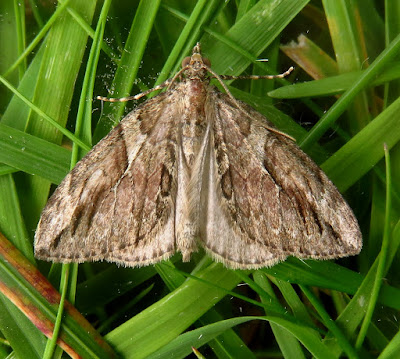Pictured above is one of the less regular hawkmoths, the colourful small elephant hawkmoth, which turned up on three nights.
The hawkmoth quartet of privet hawkmoth and elephant hawkmoth on the top row with lime hawkmoth and small elephant hawkmoth on lower row, were all seen on Monday 8th.
The pine hawkmoth made an appearance on the night of Tuesday 9th.
The poplar hawkmoth was seen on Tuesday 2nd and also on Wednesday 10th.
The aptly named eyed hawkmoth with the colourful eye markings was found in the trap on the 2nd.
The day-flying hummingbird hawkmoth was watched hovering in front of some salvia flowers in the garden on Saturday 13th for a minute or so before zooming away.
The leopard moth with the black spots on the wings, just the one individual seen.
The orange moth seems to be very slowly increasing and less restricted to woodlands.
This scarce silver lines was the second individual seen in the last fortnight.
The plain looking Clancy's rustic was the scarcest moth seen with only a scattering of sightings previously elsewhere in Essex of this immigrant from the continent.
Another species that has been slowly increasing its range in recent years is this small ranunculus. One was also trapped in the Firs Chase garden in 2014.
The cryptically marked buff-tip moth looks just like a snapped off twig.
Another moth on the increase in Essex is this cypress carpet whose caterpillars feed on cypress trees.














No comments:
Post a Comment